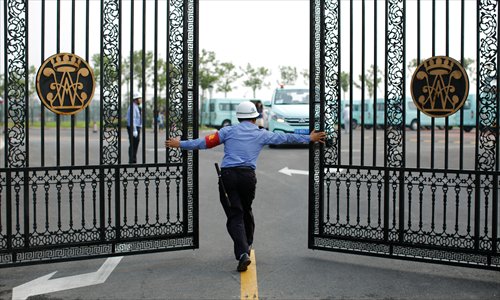Parents fear UK classes losing character due to many Chinese students

A security guard opens the gate of Wellington College International Shanghai on August 25, 2014. The British school opened this Shanghai branch in 2013. Photo: IC
Chinese students have tended to come to the UK at a younger age in recent years, which means they come to Britain not only for higher education, but also for high school or even primary school. Asian investors have followed this trend, and started to buy independent schools to serve this demand.
An article carried by the Times of London on October 17 reported that last year Chinese-owned company Achieve Education bought Chase Grammar, a boarding and day school in Cannock, Staffordshire. Chase Grammar includes a program that offers extra support for pupils from China.
More such sales are reportedly in the pipeline, as smaller private schools welcome foreign investment, and China wants a slice of British education.
"This trend is very good and I am not at all surprised," Barnaby Lenon, chairman of the Independent Schools Council and former headmaster of Harrow School, told the Global Times, adding that Chinese people like the English education system. "We welcome Chinese investors in British private education."
Authentic British experience
Founded in 1879, Chase Grammar School claims to retain the best of traditional educational methods.
"Chase Grammar School is small, with just over 300 students, and the classes are small, averaging 15 students ... It gives the school a family atmosphere," Jackie Medhurst, principal of Chase Grammar School, said in a welcome note on the school's website.
Small class sizes, personal care, good exam results, and entry to world famous universities are features that are most attractive to Chinese students. But many parents are also worried that foreign investors might expand the proportion of international students, and that might undermine the British tradition.
Chinese parent Jie Chen, a mother of three who has lived in Birmingham for 20 years, told the Global Times, "We would like to send our kids to independent schools which also take international students. But we would like to know that the school does not take too many students from one single country. Otherwise, it wouldn't be an English experience."
It seems that Chase Grammar does not intend to hide their attempts to attract Chinese families. It has set up a China office in Shanghai to facilitate Chinese parents' communication with the school. Tong Zhou, a director of Chase Grammar, told the media that the school does not intent to change the ratio of local students and international students.
Chinese acquisitions of British boarding schools actually started in 2009.
Many smaller or less famous British private schools are trapped in financial difficulties. A case in point is a 400-year-old boarding school in west Cumbria that was closed this summer because of low pupil numbers. Governors at St Bees School said it had been struggling since the economy collapsed in 2008, according to a BBC news report earlier this year.
For some private schools, funds from overseas can help them maintain the operation and avoid collapse. For Asian investors, the acquisition of British independent schools is putting money in a safe haven.
Rising demand from China
Some international branches of British boarding schools are very popular in Asia. In recent years, the Chinese passion for the British boarding school system has led some of the best-known schools such as Harrow and Wellington to set up satellite schools in Beijing, Shanghai and Hong Kong. And the trend continues.
As headmaster of Harrow, Lenon helped set up two branches, one in Hong Kong and one in Beijing.
The success in Asia has brought profits to the parent schools in Britain, and attracts more students from Asian wealthy families to study in Britain.
It seems that the rising wealthy class in Asia is not satisfied with international branches in their own countries. They want to send their kids to the original British boarding schools to be surrounded by English people and immersed in the British culture.
According to the latest data from the Independent Schools Council, which represents 1,200 of Britain's leading private schools, 20.9 per cent of all non-British pupils whose parents live overseas now come from the Chinese mainland, and an additional 17.6 percent from Hong Kong.
"The number has doubled between 2007 and 2015," Lenon said.
To support their children studying in the UK, Chinese parents are buying properties in Britain. According to a survey by UK Property Weekly, properties near universities and outstanding primary and secondary schools are the most preferable location for Chinese buyers.
Susan Hamlyn of the Good Schools Guide advice service told the Telegraph newspaper in May that foreign parents were attracted by a form of traditional British education that is now sometimes out of reach for middle-class British families.
Still, it's very difficult for foreign students to go to the best independent schools, because they don't have the academic background. And once they arrive, they need to overcome homesickness, culture shock and other difficulties.
Compared to the independent school system, universities are more open. It is reported that China remains the leading source of international students for London.
"China is the leading international student groups contributing to London's economy with £407 million ($617 million) last year, followed by the US and India," Michele Mazza, economist at London & Partners, the city's promotional company, told the Global Times. The number of Chinese students in London has grown by 49 percent since the 2009-10 school year and 72 percent since the 2005-06 school year.
Newspaper headline: Chinese buy slice of British education